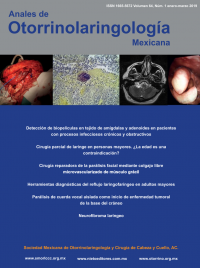Metastatic cervical adenopathies and therapeutic approach.
An Orl Mex. 2018 abril-junio;63(2):47-52.
José Francisco Gallegos-Hernández, José Alberto Abrego-Vázquez, Héctor Alberto Arias-Ceballos, Aldo Olvera-Casas, Gerardo Gabriel Minauro-Muñoz, Alma Lilia Ortiz-Maldonado, Martín Hernández-San Juan, David García
Departamento de Tumores de Cabeza y Cuello, Hospital de Oncología, Centro Médico Nacional Siglo XXI, IMSS, Ciudad de México.
Resumen
ANTECEDENTES: Los pacientes con metástasis voluminosas de carcinoma epidermoide de cabeza y cuello representan un reto para la decisión terapéutica; se debe lograr equilibrio entre control oncológico y complicaciones. La secuencia terapéutica no tiene efecto en la supervivencia, pero sí en las secuelas.
OBJETIVO: Conocer los resultados oncológicos de pacientes con metástasis en el cuello.
MATERIAL Y MÉTODO: Análisis retrospectivo efectuado de 2009 a 2015 con pacientes que recibieron tratamiento por metástasis ganglionares cervicales de carcinoma epidermoide; la secuencia terapéutica se decidió con base en el volumen, resecabilidad, sitio, tamaño del tumor primario y estado general del paciente. Se calculó la supervivencia global y con base en estado de VPH.
RESULTADOS: Se incluyeron 30 pacientes, 22 hombres y 8 mujeres con media de edad de 57 años; 10 pacientes estaban en estadio N3 y 20 en N2. En 13 pacientes el VPH fue positivo, en 5 negativo y en 12 no se determinó. Siete pacientes fueron tratados con quimioterapia inicial y a 23 se les efectuó disección de cuello; la supervivencia a cinco años fue de 25% y el pronóstico fue mejor en los pacientes VPH-positivos.
CONCLUSIÓN: El tratamiento de las metástasis cervicales depende de su resecabilidad; debemos favorecer la cirugía inicial; el VPH es un factor de buen pronóstico.
PALABRAS CLAVE: Cáncer de cabeza y cuello; carcinoma epidermoide.
Abstract
BACKGROUND: Patients with bulky metastases of squamous cell carcinoma of the head and neck represent a challenge for the therapeutic decision; balance between oncological control and complications should be achieved. The therapeutic sequence has no impact on survival but it has on sequelae.
OBJECTIVE: To know oncological results of patients with neck metastasis.
MATERIAL AND METHOD: A retrospective analysis was done from 2009 to 2015 with patients undergoing treatment for cervical lymph node metastasis of squamous cell carcinoma. The therapeutic sequence was decided based on volume, resectability, site and size of the primary and general condition of the patient. Overall survival was calculated based on HPV status.
RESULTS: There were 30 patients, 22 men and 8 women with a mean age of 57 years, 10 N3, and 20 N2. In 13 the HPV was positive, in 5 negative and in 12 the determination was not made. Seven patients were treated with initial chemotherapy and 23 underwent neck dissection; the 5-year survival was 25% and the prognosis was better in the positive HPV.
CONCLUSION: The treatment of cervical metastasis depends on its resectability; we should favor the initial surgery; the HPV is a factor of good prognosis.
KEYWORDS: Head and neck cancer; Squamous cell carcinoma.


